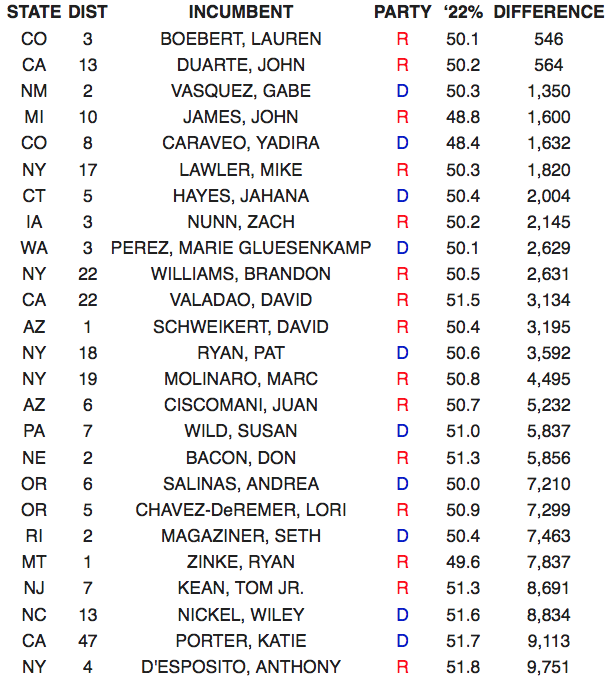By Jim Ellis — Jan. 9, 2023
House
Speaker: A Dive Into the Numbers — The internal US House voting process that elected California’s Kevin McCarthy as Speaker Friday night on the 15th roll call was arguably even closer than the final 216-212-6 tally suggested.The two closest congressional elections, those of Reps. Lauren Boebert (R-CO) and John Duarte (R-CA), both would have affected the Speaker race outcome had the pair not won their tight November electoral contests.
Though Boebert supported other members on the first 13 roll calls, her “present” vote on the last two helped make the difference in McCarthy’s marathon campaign for the Speakership. Rep. Boebert won her western Colorado re-election campaign with only a 546-vote margin. Duarte was victorious with a similar 564 vote spread in central California. Combined, the aggregate 1,110 vote victories ultimately provided what McCarthy needed to finally reach majority support.
In all, 25 November US House races were decided by less than 10,000 votes apiece. Of those, Republicans won 15 and Democrats 10. In 15 of these 25 elections, we saw the winning candidate flip the district from the previous party’s representation to his or her own.
It is likely that most, if not all, of these 25 closest 2022 contests will become targeted races in the 2024 election cycle. Throughout the long election cycle, we will be paying particular attention to the 10 districts where the electorate voted opposite of the prognosticators’ pre-election calculation.
The FiveThirtyEight data organization, for example, rated all 435 House districts using past election trends, voter registration, and other statistics to formulate a point spread favoring a nominee of one party or the other.
The following 10 members over-performed their party’s projection and won a close contest in a seat that was expected to favor the opposite party’s nominee:
- Rep. Marie Gluesenkamp Perez (D-WA-3; R+11)
- Rep. David Valadao (R-CA; D+10)
- Rep. Anthony D’Esposito (R-NY; D+10)
- Rep. John Duarte (R-CA-13; D+7)
- Rep. Mike Lawler (R-NY-17; D+7)
- Rep. Susan Wild (D-PA; R+4)
- Rep. Yadira Caraveo (D-CO-8; R+3)
- Rep. Wiley Nickel (D-NC; R+3)
- Rep. Lori Chavez-DeRemer (R-OR; D+3)
- Rep. Brandon Williams (R-NY; D+2)
Redistricting may very well be back on the table for the 2024 congressional cycle, however. Irrespective of the US Supreme Court deciding the Alabama racial gerrymandering and the North Carolina partisan gerrymandering and legal jurisdiction cases before the end of June, we can expect redraws occurring in certain states.
The legislatures will likely redraw interim court-mandated maps in New York, North Carolina, and Ohio. Based upon a recent federal three-judge court ruling, South Carolina has been ordered to produce a new congressional map by March 31. The impending SCOTUS rulings could force Alabama, Illinois, Louisiana, and North Carolina (if not already done so by the time the high court rules) to change their maps.
The redraws would potentially help Republicans in Illinois and North Carolina, and Democrats in Alabama, Louisiana, New York, and South Carolina. The Ohio situation is unclear, at least for now.
With impending map changes coming in the aforementioned states, and possibly several more depending upon just how far-reaching the future SCOTUS decisions prove, we could again see a large number of seats falling into the competitive realm. This, in addition to the aforementioned 25 close likely targets from the previous election cycle.
Those members are listed in their entirety below:








